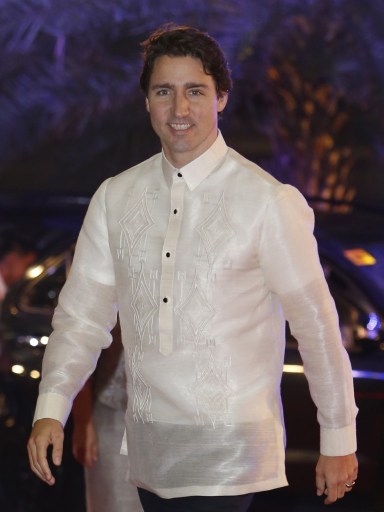Remembering how Canada’s Trudeau became Liberal star who dazzled

Canada’s Prime Minister Justin Trudeau. (AFP PHOTO / POOL / EDGAR SU)
The term “political rock star” has not been applied to many Canadian leaders, but when Justin Trudeau stormed into office in a 2015 landslide election, it appeared to fit.
More than nine years after he initially wooed voters with a progressive agenda, Trudeau is leaving office, with his Liberal Party set to elect a new leader on Sunday.
Facing dismal opinion poll numbers, Trudeau in early January announced his plans to resign, concluding Liberal in-fighting had left him unable to lead the party into another election.
The two months since Trudeau announced his resignation have been the most turbulent in recent Canadian history.
President Donald Trump has continued to muse about making Canada the 51st US state and launched a trade war Trudeau says is aimed at collapsing the Canadian economy to make annexation “easier.”
The prime minister, demeaned repeatedly by Trump as “Governor Trudeau,” has partly repaired his standing among voters who, before Christmas, seemed desperate for him to go.
He has won praise for a series of resolute speeches in response to Trump’s various tariff actions, including this week, when he warned Canadians that trade chaos with the United States would cause economic pain.
“When it comes to defending our great nation, there is no price we all aren’t willing to pay,” he said.
Trudeau said this week he will agree on a timeline to hand over power, once a new Liberal leader is chosen.
– ‘Canada is back!’ –
“Trudeaumania” was first used to describe reaction to Trudeau’s father, Pierre Elliott Trudeau, who became a global celebrity when he led Canada in the late 1960s and 70s, dating Barbra Streisand and developing a friendship with Fidel Castro.
The phrase came back when Justin Trudeau — who had previously been a snowboard instructor, bartender, bouncer and teacher — rose to the top of Canadian politics.
The 53-year-old father of three entered parliament in 2008 representing a Montreal constituency.
He took over a Liberal Party in tatters in 2013, before winning the 2015 general election.
“Why can’t he be our president?” Rolling Stone magazine asked on a 2017 cover, six months into Trump’s first term.
Trudeau’s positions seemed well pitched to left-of-center voters in Canada and beyond.
He promised action on climate change and a defense of Indigenous and refugee rights.
When asked why he prioritized gender parity in his first cabinet, Trudeau famously replied, “because it’s 2015.”
When he travelled abroad, young people lined up for selfies.
“Canada is back!” he declared after ousting an entrenched Conservative prime minister, the unquestionably less glamorous Stephen Harper, in 2015.
– Support fades –
Within Canada, the honeymoon was short-lived.
There were steps that pleased supporters, like a public inquiry into missing and murdered Indigenous women, legislation permitting medically assisted suicide, and the legalization of cannabis.
But on core issues like climate change and reconciliation with Indigenous communities, Trudeau “has not been the reformer that many had hoped for,” said Maxwell Cameron, a political science professor at the University of British Columbia.
Trudeau was narrowly re-elected to lead minority governments in 2019 and 2021.
Genevieve Tellier, a political science professor at the University of Ottawa, said the disappointment that ultimately engulfed Trudeau was so acute because he “promised so much.”
– Progressive record-
As Liberal Party critics came forward last year, Trudeau initially resisted calls to go.
But in December he suffered a blow that appeared conclusive.
His long-time ally, finance minister and deputy prime minister Chrystia Freeland resigned, issuing a scathing letter that accused Trudeau of placing his political goals above the public good.
She charged that instead of preparing Canada’s finances to withstand Trump’s trade war, Trudeau was focused on costly vote-buying gimmicks, like a Christmas tax holiday.
Freeland’s resignation seemed to break a dam of Liberal Party dissent.
She is now a candidate to replace him as Liberal leader, behind front-runner Mark Carney, a former central banker.
For Stephanie Chouinard, a political science professor at Queen’s University, the Trudeau era should not be dismissed as a failure.
She highlighted his social programs, which included a national plan to make early childhood care cheaper.
“It was a progressive government unlike anything we have seen since the 70s,” she said.